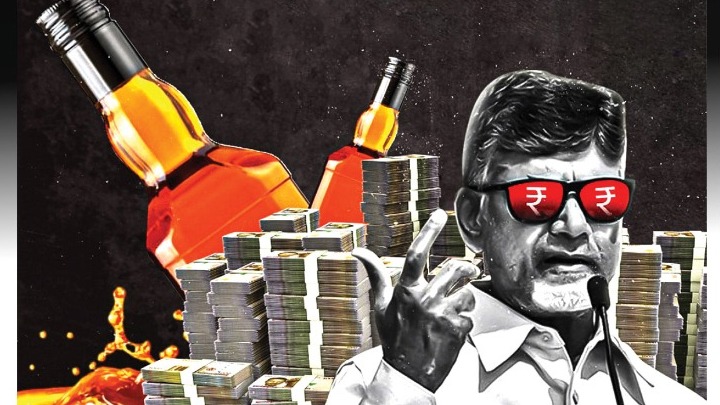During the Telugu Desam Party (TDP) government’s tenure from 2014 to 2019, under the leadership of then-Chief Minister N. Chandrababu Naidu, Andhra Pradesh witnessed a massive liquor scam that drained the state exchequer of over Rs 5,000 crore. According to investigations initiated by the YSR Congress Party (YSRCP) government under Y.S. Jagan Mohan Reddy, this scandal was orchestrated at Naidu’s direction, involving the manipulation of excise policies to favor select distilleries and liquor businesses linked to TDP leaders. The Criminal Investigation Department (CID) probed the scam, registered cases, and named Naidu as Accused No. 3 (A3) in the First Information Report (FIR). In response, Naidu and his allies are launching a counteroffensive, fabricating allegations of a non-existent liquor scam under the YSRCP regime to deflect scrutiny.
The Scope of the Liquor Scam
The liquor scam caused an annual loss of Rs 1,300 crore, totaling over Rs 5,000 crore across five years. The TDP government is amending the 2012 excise policy to benefit distilleries like SPY Agro Industries (owned by former Nandyal MP SPY Reddy), Visakha Distillery (linked to Ayyannapatrudu), and PMK Distillery (owned by a relative of former minister Yanamala Ramakrishnudu). These policy changes included removing an 8% VAT and an additional 6% tax on turnover, against the recommendations of a three-member committee that advised increasing taxes by 6-10%. From 2012 to 2015, the state earned Rs 2,984 crore in taxes, but post-2015 policy shifts led to significant revenue losses, undermining the state’s financial health.
CID Investigation and Legal Actions
The YSRCP government’s CID investigation uncovered evidence of Naidu’s direct involvement. The FIR named Naidu as A3, alongside the Excise Commissioner I.S. Srinath (A1) and Excise Minister Kollu Ravindra (A2). Cases were filed under various sections of the Indian Penal Code (IPC) and the Prevention of Corruption Act, including sections 166, 167, 409, 120(2), 25, 34, and 13(1)(2). The Anti-Corruption Bureau (ACB) court approved further inquiry based on the CID’s findings. The investigation was triggered by a complaint from Andhra Pradesh State Beverages Corporation Managing Director D. Vasudeva Reddy, highlighting irregularities in liquor procurement and taxation.
Key Irregularities Uncovered
The scam involved several fraudulent practices, including:
- Quid Pro Quo Deals: The CID revealed that the TDP government engaged in quid pro quo arrangements, favoring specific distilleries in exchange for undisclosed benefits.
- Artificial Demand Creation: Suppliers colluded with licensees to inflate demand for certain liquor brands with no market traction, leading to skewed procurement by the state beverages corporation.
- Lack of Oversight: Between 2015 and 2019, there was no mechanism to verify actual demand and supply data, enabling fraudulent practices.
- Post-Election Favoritism: After the 2019 election notification, the TDP government hurriedly placed orders favoring select distilleries, with 70% of liquor brands sourced from a handful of companies, violating regulations.
Policy Manipulations and Cabinet Bypassing
The TDP government bypassed cabinet approval to implement policies that favored private distilleries. A notable instance involved the removal of the privilege fee on liquor procurement, executed through Government Order (GO) 218 on June 22, 2015, without cabinet discussion. A note file from the Excise Commissioner initially proposed increasing the privilege fee tenfold but was revised on the same day to recommend its removal, with a copy sent to Naidu’s Principal Secretary. Similarly, a circular on September 1, 2015, scrapped the privilege fee for bars, predating a fabricated bar owners’ petition dated September 9, 2015. This was formalized through GO 468 on December 11, 2015, with digital signatures from Naidu and Kollu Ravindra, indicating a deliberate cover-up.
TDP’s Counteroffensive and Propaganda
To deflect scrutiny, Naidu and his allies fabricated a narrative of a liquor scam under the YSRCP government, which the CID found to be baseless. The TDP-led coalition misused the Special Investigation Team (SIT) to frame YSRCP leaders with false charges and spread misinformation about the YSRCP’s transparent liquor policy. These actions are seen as an attempt to shift focus from the TDP’s own financial irregularities.
Financial and Governance Impact
The liquor scam had a profound impact on Andhra Pradesh’s finances, with an estimated Rs 1,300 crore lost annually, totaling over Rs 5,000 crore. The Accountant General’s audit confirmed these irregularities, highlighting the state’s loss due to policy manipulations. The TDP government’s actions prioritized private distilleries over public interest, causing long-term economic damage and eroding public trust in governance.
Mastermind
The 2014-19 liquor scam, masterminded by Chandrababu Naidu, represents a significant case of financial mismanagement and corruption. The CID’s detailed investigation, supported by court approvals, has exposed the extent of favoritism and policy manipulation under the TDP regime. As legal proceedings continue, the case underscores the importance of transparency and accountability in state governance, while Naidu’s counteroffensive highlights the challenges of addressing entrenched political corruption.











